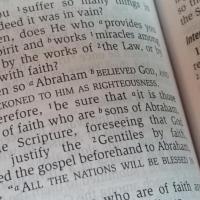"We were held captive under the law ... imprisoned until the coming faith would be revealed ... but now that faith has come, we are no longer under a guardian" (Galatians 3:23-26).
Visit Our Messianic Synagogue
Beth Immanuel is a friendly and welcoming community. Click here to learn what to expect when you visit.
Join us as we enthrone the God of Israel with praise and uplift the name of Yeshua the Messiah!
Our Messianic Synagogue is located in historic Hudson, Wisconsin, just minutes away from St. Paul, Minnesota.
We always welcome visitors, but special events and holidays are wonderful times to visit.
Messianic Jewish Teaching
Download and listen to uplifting and insightful teachings presented by D. T. Lancaster and special guests.
Read and study teachings and Bible studies from a Messianic Jewish perspective on a variety of topics.
Grow and learn daily through interactive video lessons from a variety of teachers.










